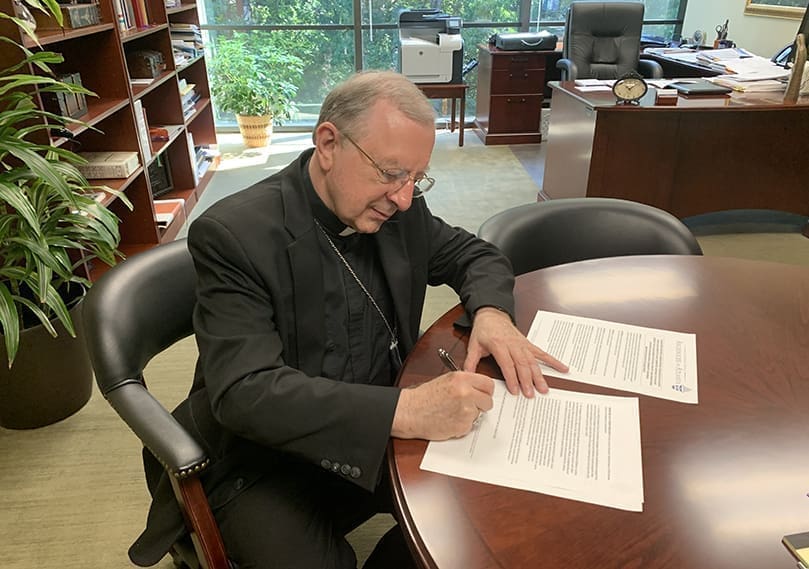 Photo Courtesy of Justice and Peace Ministries
Photo Courtesy of Justice and Peace MinistriesAtlanta
Archdiocese taking part in census awareness campaign
By MARK WOOLSEY, Special to the Bulletin | Published November 28, 2019
ATLANTA—The 2020 census count doesn’t commence until next spring, but preliminary planning is underway as U.S. Census Bureau officials toil to establish working relationships with local and community groups to help ensure a comprehensive count. And the Archdiocese of Atlanta is figuring into that process in a prominent way.
Hector Montalvo, a “partnership specialist” with the U.S. Census Bureau Atlanta office says the cooperation that church officials have shown to date is exemplary by any yardstick.
“They have been great,” he said. “Participation has exceeded all expectations.” Montalvo lauds church officials for doing such things as utilizing social media to get the word out and partnering with a Spanish language radio station for an interview and public service announcement campaign.
Montalvo says those efforts dovetail in with a broader strategy of census strategists working with local governments, the private business sector and non-profits. They’re being encouraged to set up “Complete Count Committees” tasked with spreading the word about both the mechanics and the importance of the process—particularly in regards to so-called “hard-to-reach populations” such as renters, those not speaking English as a first language and seniors. The notion is gaining traction with local church officials.
“We partner with leaders in their communities,” he said. “They’re the ones who know best about the demographics of an area. Without those partnerships, it’s very difficult to spread the word,” and to build trust.
Officials stress the once-in-a-decade constitutionally-mandated headcount is not only crucial in congressional re-appointment and redrawing legislative boundaries, it also figures into how billions upon billions in government aid dollars are allocated among jurisdictions. What’s more, the data it churns out aids nonprofits—such as Catholic Charities—in deciding where to focus their time and resources.
That last bit of reasoning resonates strongly with Kat Doyle, director of Justice and Peace Ministries for the Archdiocese of Atlanta. She anticipates having numerical and demographic information will help local parishes decide where and how to allocate resources to food pantries, pre- and after-school programs and other forms of outreach.
Doyle stressed that “Catholic social teaching tells us we must provide options for the poor, helping the poor to receive what they need so they can live their fullest life. If we are truly living our faith we are called to make sure the poor and vulnerable and the marginalized are being counted, so that we can take care of them.”
She said a resolution signed recently by Bishop Joel Konzen, SM, diocesan administrator, encourages local parishes to cooperate and set up count committees—and some are in the formation stages. She added that some congregations with historically high census participation rates may not need the committees—a series of Sunday bulletin announcements might suffice. Others will undoubtedly gravitate toward a more robust approach—one that could involve shoe leather and taking to the streets.
Examples include parishes with heavy concentrations of African Americans and Hispanics. Some members of those groups have been reluctant to cooperate over fears of discrimination and harassment, even deportation. Doyle said densely-populated mobile home parks could pose an equally tough challenge. She foresees an effort to set up spots within those communities where residents can get forms filled out and questions answered. Volunteer parishioners canvassing to spread the word could also be helpful, she said.
Already some congregations in the archdiocese are working to address such challenges. Adriana Sargent, business manager of the St. John Paul II Mission in heavily-Hispanic Gainesville, said a specialist spent several days speaking to parishioners after Mass and to adult groups on weeknights.
Sargent said when the partnership specialist spoke, “there were questions about confidentiality and she explained that there was no need to panic.” She said that seemed to allay concerns.
Another Gainesville congregation, St. Michael Church, took a slightly different approach, inviting census officials to take part in their annual fall festival Oct. 20.
“They came with a little (informational) game,” said volunteer Beth Andert. “And you could play and according to what happened in the game people could win prizes, like coffee mugs and tablets.”
Andert said officials also mounted a recruitment effort for census workers.
Doyle said whatever plans local parishes are making to aid in a successful process are almost fully organized. She indicated that the efforts gearing up at the parish level the next few months will have an impact years down the road.
“When it comes to distribution of funds over the next ten years, the money follows the census numbers,” she said. “We want to make sure the numbers represent the need.”